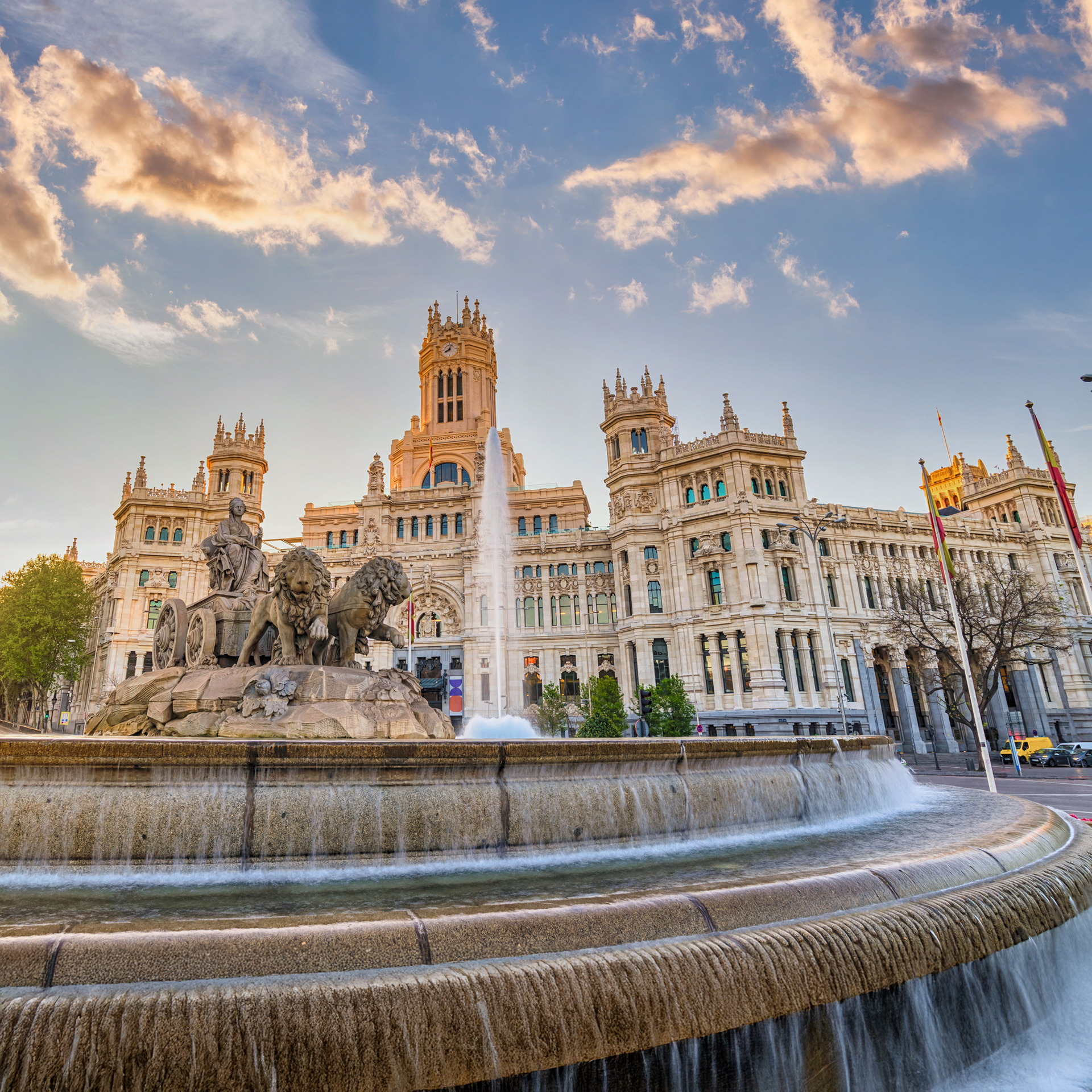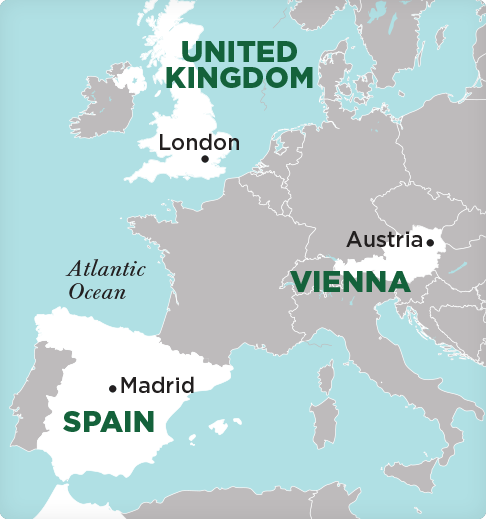Credits
16
Prerequisites
None
Courses taught in
English
Dates
Aug 31 – Dec 13
Program Countries
Austria, Spain, United Kingdom
Program Base
United Kingdom, Spain, Austria
Visa
Varies
Critical Global Issue of Study
Geopolitics & Power

Europe in transition: Compare political systems and struggles—what shaped Europe, what destabilizes it, and what’s ahead.
16
None
English
Aug 31 – Dec 13
Austria, Spain, United Kingdom
United Kingdom, Spain, Austria
Varies
Geopolitics & Power
Through a comparative and interdisciplinary lens, this program invites students to explore the complexities of contemporary European politics by living and learning in three major European capitals—London, Madrid, and Vienna. Examine how Europe’s recent past continues to shape its present and how current political, social, and economic challenges are influencing the continent’s future. From questions of regional identity and cohesion to shifting alliances, immigration, populism, defense, and governance, students will investigate how nations are responding to pressures both from within and beyond Europe’s borders.
Drawing from political science, international relations, sociology, and regional studies, the program combines classroom learning with field-based observation, guided excursions, guest lectures, and engagement with local communities and institutions. Meet with elected officials, policy experts, NGOs, academics, and grassroots movements to understand how different countries interpret and respond to the challenges of European integration, globalization, and democratic governance.
Throughout the semester, students will complete a comparative research project, using fieldwork methods to analyze national and transnational dynamics across the three sites. By immersing themselves in these distinct yet interconnected contexts, students will gain a nuanced understanding of how Europe is evolving—and what that means for its future as a global political actor and unified region.
Receive up to $1,000 in flight credits when you join this new program! Learn more HERE
None.


London is a critical site for understanding contemporary European politics. As the capital of a major financial hub and former colonial power, the UK offers insight into the complexities of post-Brexit Europe, shifting relations with the EU, and its evolving global role. In London, students can examine the political consequences of nationalism, populism, and regional disintegration, as well as the challenges Brexit poses to European unity. The city also hosts key institutions in diplomacy, governance, and policy analysis—making it an ideal setting for studying the tensions between national sovereignty and regional cooperation.
Madrid offers a distinct vantage point on Europe’s evolving political landscape. Situated at the intersection of Europe, North Africa, and Latin America, Spain brings a global outlook to regional debates on migration, governance, and identity. Madrid is a key site for understanding how EU member states navigate internal divisions and respond to shifting policy frameworks—from Catalonia’s independence movement to broader questions of solidarity and cohesion within the European Union. The city provides rich opportunities to examine how history, geography, and politics converge in shaping Europe’s future relationships—both within and beyond its borders.
Vienna bridges Europe’s past divisions and future alliances. As a historic center of diplomacy and dialogue, the city is home to key institutions, such as the United Nations and the OSCE, offering students a front-row seat to European and international affairs. Austria’s central location—and its political, cultural, and historical ties to both Eastern and Western Europe—makes Vienna a compelling setting to explore questions of security, neutrality, and regional cooperation. From EU policymaking to relations with the Balkans and Eastern neighbors, Vienna provides a strategic context for examining Europe’s role in a shifting geopolitical order.
Please note that SIT will make every effort to maintain its programs as described. To respond to emergent situations, however, SIT may have to change or cancel programs.
Upon successful completion of the program, students will be able to:
The following syllabi are representative of this program. Because courses develop and change over time to take advantage of dynamic learning opportunities, actual course content will vary from term to term.
The syllabi can be useful for students, faculty, and study abroad offices in assessing credit transfer. Read more about credit transfer.
Modern Europe: Foundations and Transformations – syllabus
(EURO3000 / 4 credits)
This course introduces students to the historical, political, and ideological foundations of modern Europe. It covers key events such as the rise and fall of totalitarian regimes, the emergence of social democracy, the Cold War, European integration and the European Union, and post-Cold War transformations. Students will examine how different political systems—parliamentary democracies, constitutional monarchies, and hybrid regimes— affect governance and policymaking. The course also explores shifting identities within Europe, the role of nationalism, and the evolving debate over European unity and sovereignty.
Present Challenges in Europe – syllabus
(IDST3030 / 4 credits)
This course investigates contemporary political, social, and economic issues that challenge the European project and impact the daily lives of Europeans. Topics include defense strategies and diplomatic ties, the refugee crisis, immigration policies, the rise of right-wing populism, economic inequality, illiberal democracies, and Brexit’s long-term implications. Students will analyze how different nations have responded to these challenges and the broader implications for European integration, regional stability, and global influence. Through case studies and guest lectures, students will gain an understanding of policy debates and political conflicts shaping Europe’s present landscape.
The Future of Europe – syllabus
(EURO3054 / 4 credits)
This course focuses on key trends shaping Europe’s future, including the sustainability of the European Union, economic shifts, climate governance, and the transformation of the welfare state. Students will examine critical debates on the European Monetary Union, neoliberal policies, and the balance between national sovereignty and regional cooperation. Topics include deindustrialization, economic migration, the role of technology in politics, and the impact of demographic shifts. An important topic is the relationship with the United States on the future of Europe. The course also explores potential scenarios for Europe’s political evolution and global standing in the coming decades.
Project Politics: Community Engagement and Ethical Inquiry – syllabus
(POLI3500/ 4 credits)
This course combines community engagement and self-directed inquiry to deepen students’ understanding of politics across diverse European contexts. At each program site, students collaborate with local organizations on community-initiated projects while developing intercultural communication and ethical engagement skills. Simultaneously, they pursue an inquiry-based project on an approved political issue of their choice—such as EU governance and democratic legitimacy, the effects of populism on national politics, youth and political movements, or the political implications of migration patterns. With guidance, students will use appropriate methods to explore their topic across each program site and present their work in a final comparative project and presentation.


Potential career paths include:
Foreign service officer/diplomat
Policy advisor on EU or transatlantic relations
Political risk analyst
International NGO or intergovernmental organization staff
Policy analyst (migration, defense, education, economic policy)
Political party staffer or campaign strategist
Advocacy roles in civil society organizations or watchdog groups
Data or policy analyst at a research center focused on migration, populism, or EU governance
Graduate programs in political science, international relations, European studies, or global governance


SIT Study Abroad is committed to ensuring that international education is within reach for all students. We believe in the transformative power of immersive, intercultural experiences and are dedicated to supporting students in their educational journey.
See All Costs
A critical step in preparing for your study abroad program is planning how you will maintain your health and wellbeing. Please review the following information carefully and contact [email protected] with any questions or concerns.

Depending on your passport of origin, you may need a visa for this program. Please contact your admissions officer for more information.